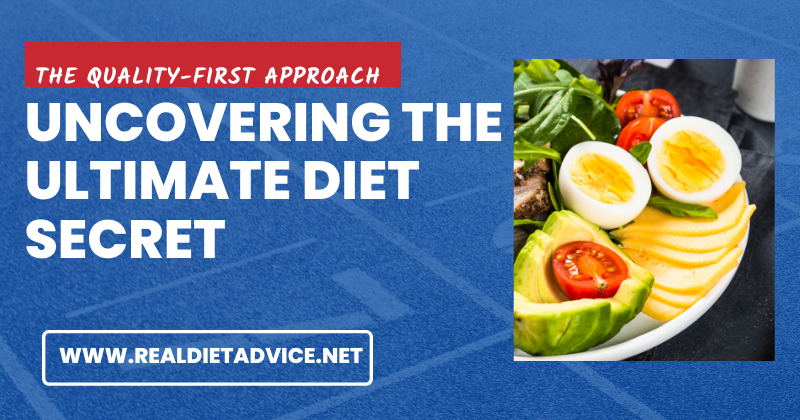In an age where fad diets and quick fixes dominate the nutrition space, we introduce a revolutionary concept: the Quality-First Approach. This article delves into the ultimate secret of dieting, highlighting the importance of the quality of food we consume over mere calorie counting. Our focus shifts from the conventional quantitative to a more qualitative approach, emphasizing nutrient-rich, wholesome foods. In the quest for optimal health and sustainable weight loss, we argue that what you eat matters as much, if not more, than how much you eat. This perspective is not about restrictive eating; rather, it’s about making conscious, informed food choices that nourish your body. The Quality-First Approach could be the answer to the ever-pervasive question: what is the best diet for me? We invite you to explore this empowering paradigm shift in the world of nutrition, promising not just weight loss, but overall health and well-being. Prepare to uncover the ultimate diet secret that could transform your relationship with food for the better.

What is the Ultimate Diet?
The Ultimate Diet Secret is not about finding a magic bullet or a one-size-fits-all diet plan; rather, it’s the understanding that sustainable, healthy eating hinges on the quality of food you consume, not just the quantity. This implies that focusing on nutrient-dense, whole foods is more beneficial than merely counting calories or limiting food intake.
The secret lies in the simple principle of nutrition: choosing foods rich in vitamins, minerals, fiber, and healthy fats, such as fruits, vegetables, whole grains, lean proteins, and legumes. It also includes minimizing the intake of processed foods, high in sugar and unhealthy fats. This approach not only supports weight management, but also improves overall health, energy levels, and well-being.
Furthermore, the Ultimate Diet Secret encourages mindfulness – being attentive to your body’s hunger and satiety signals, and enjoying meals without distraction. It also involves cultivating a positive relationship with food, viewing it as nourishment rather than the enemy.
Ultimately, the Ultimate Diet Secret is the understanding that a diet should be a sustainable lifestyle change, promoting long-term health and wellness, rather than a quick fix. It’s about a balanced, holistic approach to nutrition that prioritizes quality first.
Over the years, dietary guidelines have evolved as science has become more accurate at determining what to eat for optimal health and weight. Although the strongest evidence shows that calorie intake is important, focusing on food’s quality can be equally as effective in preventing and promoting weight gain.
Eat high-quality food in appropriate portions.
Quality is More Important Than Calories
The slogan “A calorie’s a calorie” has been repeated many times, and it is true that not eating too much is important for your health. Recent research suggests that we shouldn’t just focus on calories, but also consider the quality of food we consume and avoid to maintain and achieve a healthy body weight. Instead of choosing foods solely based on their caloric content, choose high-quality and healthy foods.
- The Healthy Eating Plate recommends foods that are unrefined and minimally processed, such as fruits and vegetables, whole grains, healthy fats, and sources of protein.
- Low-quality food includes highly processed snacks, sugar-sweetened drinks, refined grains (white), refined sugar, fried and fatty foods, high saturated fats and trans-fats, and foods with a high glycemic index, such as potatoes.
Due to the individual differences in lifestyle and genes, there is no “perfect” diet.
Quality Counts
In one study, researchers looked at whether certain foods are more likely to cause weight gain or not. The research on specific foods allows us to determine if “a calorie’s a calorie” or whether eating more high-quality food and less low-quality food can result in weight loss and maintenance.
The Department of Nutrition at Harvard School of Public Health has shown that a calorie’s quality is very important when deciding what to eat in order to maintain and achieve a healthy body weight.
- Researchers found that the most significant weight gain was associated with consumption of processed and unprocessed meats, potato chips and sugar-sweetened drinks. Researchers concluded that processed foods high in sugar, starches, refined grains and fats could increase weight gain.
- Vegetables, whole grains and fruits, nuts and yogurt were all associated with weight loss.
- Researchers have not discounted the importance of calories. Instead, they suggest that choosing high quality foods (and decreasing consumption) can help individuals consume fewer calorie. (23)
View the HSPH press release “Changes to specific dietary factors can have a big impact on weight gain over time: A weight-loss strategy based solely on “Eat less, exercise more” may be too simplistic”

Do Macro-Nutrients Matter When Managing Diet?
In recent years, the discussion of carbohydrates, proteins and fats has become the standard for optimal diets. Researchers are comparing “macronutrient-management” style diets against one another to determine the most effective. However, so far, evidence is not conclusive.
In a 2007 study published in JAMA, four different weight loss diets were compared. These ranged from low carbohydrate to high carbohydrate. This 12-month trial monitored over 300 obese and overweight premenopausal woman, randomly assigning each to an Atkins (very-low carbohydrate), a Zone (low carbohydrate), a LEARN (high carbohydrate), ot Ornish diet (very-high in carbohydrate).
- Women in the Atkins group lost more weight after a year than women in other diet groups.
- The study also looked at secondary outcomes, such as glucose levels, cholesterol, body fat, and blood pressure, and found that the Atkins diet group was comparable or better than other diet groups.
- The other three diets, Zone, LEARN and Ornish, did not show any significant differences in weight loss.
- The study raises questions about the long-term effects of this diet, but it is still a viable recommendation to lose weight. (24)
A study published in The New England Journal of Medicine, 2009, challenged this study’s findings. It tested four different types of diets, and the results showed similar average weight loss across the diets.
- The study tracked 800 people for 2 years and assigned them to four different diets. These were low-fat with average protein, high-fat with average protein, or high-fat with high-protein.
- Researchers concluded that despite differences in macro-nutrients, all diets led to meaningful weight loss.
- The study found that participants lost more weight and gained less weight the more they attended group counseling sessions. The study supports the notion that behavioral, psychological and social factors play a role in weight loss, as well as what you eat. (25)
In 2010, The New England Journal of Medicine published a study that examined the impact of protein and glycemic indices on weight loss maintenance. Researchers implemented a low calorie diet in order to lose weight, and then looked at whether protein or glycemic impact weight loss maintenance.
- Participants were then assigned to one of five diets over a 26-week period in order to prevent weight gain: a low protein and low glycemic index diet, a high-protein and low glycemic index diet, if they had lost 8% or more of their original body weight on calorie restriction. The participants were assigned to one of five diets over a period of 26 weeks in order to prevent weight gain: a low protein and low glycemic index diet, low-protein but high glycemic index diet, high-protein, low glycemic index diet or a control.
- The low-protein-high-glycemic-index diet was associated with subsequent significant weight regain, and weight regain was less in the groups assigned to a high-protein diet than in those assigned to a low-protein diet, as well as less in the groups assigned to a low-glycemic-index diet than in those assigned to a high-glycemic-index diet.
- This study shows that modest increases in protein and modest reductions in glycemic indices led to improvements in weight loss maintenance. (26)
Conclusion
These three studies show that a macro-nutrient based diet can have some benefits. However, research shows that while one person may lose weight on a certain diet, another may not due to differences in lifestyle and genes. There is no “perfect” diet that fits everyone. It’s great to know that anyone can choose healthy foods and follow the Healthy Eating Plate guidelines in order to create a diet tailored for them.
Recommended Post For You
- Custom Keto Diet Review – The Truth You Need To Know!
- Best Low Carb Diet Plan For Beginners
- Building a Balanced Plate: A Practical Guide to Real Diet Advice for Everyday Eating
- Real Diet Advice: Uncovering Evidence-Based Nutrition Strategies for Optimal Health
- Debunking Diet Myths: A Comprehensive Guide to Authentic Weight Loss Tips
- Best Diet Plan For Weight Loss That Works
- Sustainable Weight Loss: Real Diet Advice for Lasting Results and Improved Well-being
References:
- Mozaffarian, D., et al., Changes in diet and lifestyle and long-term weight gain in women and men. N Engl J Med, 2011. 364(25): p. 2392-404.
- Gardner, C.D., et al., Comparison of the Atkins, Zone, Ornish, and LEARN diets for change in weight and related risk factors among overweight premenopausal women: the A TO Z Weight Loss Study: a randomized trial. JAMA, 2007. 297(9): p. 969-77.
- Sacks, F.M., et al., Comparison of weight-loss diets with different compositions of fat, protein, and carbohydrates. N Engl J Med, 2009. 360(9): p. 859-73.
- 26. Larsen, T.M., et al., Diets with high or low protein content and glycemic index for weight-loss maintenance. N Engl J Med, 2010. 363(22): p. 2102-13.
